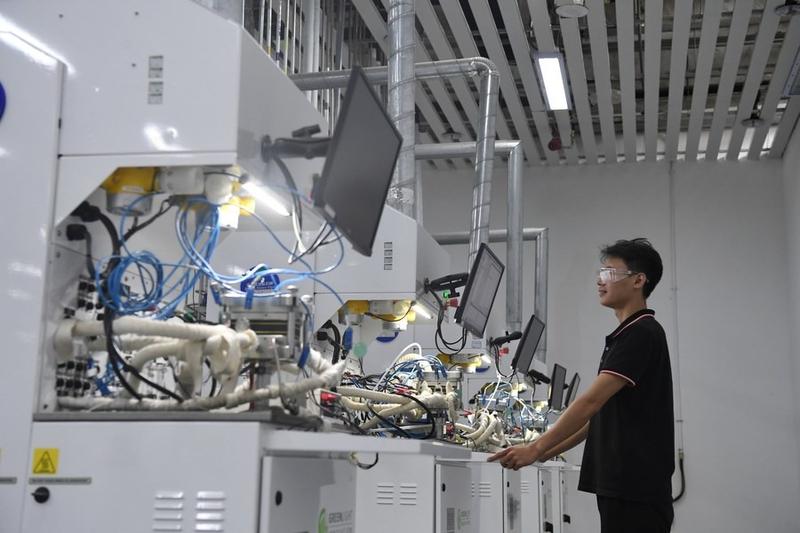 A technician works at the fuel cell test area at the hydrogen energy technology center of Great Wall Motor in Baoding, north China's Hebei province, July 15, 2021. (PHOTO / XINHUA)
A technician works at the fuel cell test area at the hydrogen energy technology center of Great Wall Motor in Baoding, north China's Hebei province, July 15, 2021. (PHOTO / XINHUA)
Last year, China's annual R&D investment exceeded 3.3 trillion yuan ($458.4 billion), an increase of 8.1 percent over the previous year, said Yin Hejun, minister of science and technology.
Yin made the remark in an interview following the opening meeting of the second session of the 14th National People's Congress on Tuesday. He added that among that, the funding for basic research was 221.2 billion yuan, an increase of 9.3 percent over the previous year.
Last year, 950,000 new technology contracts were signed in China; authorized invention patents reached 921,000, an increase of 15.3 percent from the previous year, he said.
"New energy vehicles, lithium batteries, and photovoltaic modules, the so-called 'new three items' that everyone is focusing on, had very pleasing growth rates in exports last year. Technological innovation has not only enhanced the competitiveness of our country's traditional industries but has also solidified the foundation for developing new quality productive forces, injecting momentum," he said.
Yin mentioned that last year, China achieved a number of major original achievements in quantum technology, integrated circuits, artificial intelligence, biomedicine, and new energy, including the official operation of the world's first fourth-generation nuclear power plant and the commercial operation of the C919 large aircraft.
The Ministry of Science and Technology has introduced policies to encourage units to allocate more than half of their basic research expenses to young people under the age of 35, said minister Yin Hejun
In the future, China will further increase investment in scientific and technological research and continue to strengthen basic research, strengthen the power of national strategy, leverage the advantages of national laboratories and national scientific research institutions, and build a "national team" for the construction of a strong country in science and technology, he said.
ALSO READ: Xi attends opening meeting of NPC annual session
At the same time, China welcomes international cooperation to continuously inject new innovative power for high-quality development, he said.
Yin emphasized the important role of young people in technological development: "Young people are the most creative and have the greatest potential for innovation. They are now an important force for our country to advance high-level science and technology self-reliance, and in the future, they will be the main force in building a strong country in science and technology."
Yin said that in major scientific and technological tasks, China has provided young people with opportunities and platforms as much as possible. For example, in the National Natural Science Foundation projects, 80 percent of the projects are undertaken by personnel under the age of 45; in the national key research and development program projects, there are already more than 1,100 projects led by scientists under the age of 40, accounting for over 20 percent of the total.
"In many major scientific and technological projects in the country, young people are everywhere. In major projects such as the Beidou Navigation, lunar exploration, and China's FAST telescope, the average age of many project teams is just over 30, which many countries envy greatly," he said.
ALSO READ: China's 2023 water conservancy investment hits historic high
Yin said that China will make the cultivation of young scientific and technological talents a long-term strategic task, create favorable conditions for them, "give them more trust, better help, and stronger support".
"(We will) mobilize efforts from all parties to solve their key concerns such as compensation, physical and mental health, and family life," he said.
Yin also mentioned that the Ministry of Science and Technology has introduced policies to encourage units to allocate more than half of their basic research expenses to young people under the age of 35.


